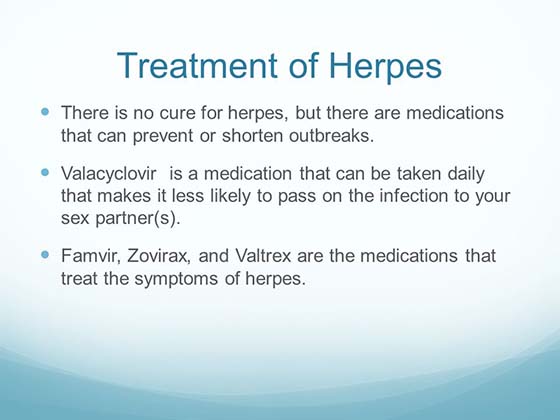Treating and Managing Herpes outbreak
If you have frequent outbreaks of any herpes, genital herpes or cold sores, there are treatment options available. Many of these treatments can help speed up the healing time of the lesions and reduce the frequency and severity of their recurrences.
There have been many attempts to find a successful cure for herpes, but to date, no permanent cure has been found. However, great progress has been made on treating the disease, and research is constantly being conducted on all aspects of the infection.

Can herpes be cured?
There is no cure for herpes. However, there are medicines that can prevent or shorten outbreaks. One of these anti-herpes medicines can be taken daily, and makes it less likely that you will pass the infection on to your sex partner(s).
Know more herpes treatment stories? Meet nearby people with herpes

PositiveSingles is one of the most popular dating websites for people suffering from herpes and other STD. It was initiated in 2001. With 1,510,800+ members you are sure to find lots of potentail people around you.
Join and meet nearby people with herpes, browse profiles and chat now!
Treatment Options for Managing Genital Herpes
In 1985, the first oral antiviral medications became available for general use. There are now three antivirals available in the US: acyclovir, valacyclovir (brand name Valtrex and famciclovir (brand name Famvir).
All three drugs work equally well when taken as directed. There may, however, be convenience advantages for medicines requiring less frequent dosing. The antivirals may be taken in one of three ways: first episode treatment, episodic therapy (the taking of medication with outbreaks only), and suppressive therapy (taking medicine every day).
The first two uses of the drug attempt to shorten the length and severity of a specific outbreak. Taking medication with outbreaks, either first or future ones, has not been shown to impact future recurrence rates of herpes
The third use of the drug, for suppression of outbreaks (i.e., to prevent outbreaks from coming), is recommended for anyone who has frequent outbreaks, who are bothered by their outbreaks, or who has an uninfected partner and wishes to reduce the risk of infecting them.
Studies with these drugs have found that 80-90% of the people who take the drug for suppression have greatly reduced frequency of outbreaks or do not have outbreaks while taking the drug. The virus is still present in the body, and after the drug is stopped, the outbreaks and shedding come back to a regular level.
While the risk of asymptomatic shedding may be greatly reduced by this medicine, it is not stopped altogether. It takes about five days for daily antiviral therapy to be functioning at peak efficiency.
These antiviral medications that are FDA-approved for the treatment of genital herpes:
Acyclovir
This anti-viral medication was first FDA approved as a topical treatment for first-time outbreaks in 1982. The topical form of the medicine was shown to shorten the first outbreak very slightly, but had no effect on recurrent disease, and the topical form has no place in the treatment of recurrent genital herpes. Oral acyclovir is indicated for use in one of three ways:
- First time outbreaks: 400 mg three times a day for 7-10 days.
- Recurrences: 400 mg three times a day for 5 days or 800 mg three times a day for two days.
- Suppression: 400 mg twice a day, every day.
Acyclovir is also available for intravenous use in babies and adults for whom more aggressive treatment is necessary. It is available in a liquid form for people who have difficulty swallowing pills.
valacyclovir (generic)
This FDA approved medicine, whose brand name is Valtrex, may be used for first outbreaks, recurrent outbreaks and suppression. It is also approved to reduce transmission of genital herpes from an infected person to an uninfected one. Valacyclovir and famciclovir are both effective for treatment outbreaks for a single day.
- First time outbreaks: 1000 mg twice a day for ten days.
- Recurrences: 2 grams, twice in a day, 12 hours apart, for one day. Or 500 mg twice a day for three days.
- Suppression: Either 500 mg or 1000 mg once a day. I usually start patients with 500 mg and see how it goes. If there are frequent breakthroughs, it can be increased to 1000 mg (1 gram) once a day or 500 mg twice a day. Doses are taken every day.
famciclovir (generic)
This antiviral medication has been FDA approved for recurrent disease and suppression. The FDA has not approved famciclovir for first episode treatment, though the CDC does describe a dosing regimen for this purpose and it works just fine:
- First time outbreaks: 250 mg three times a day for ten days.
- Recurrent outbreaks: famciclovir 1000 mg orally twice daily for 1 day
- Suppression: 250 mg twice a day every day.
Antiviral medication is commonly prescribed for patients having a first episode of genital herpes, but they can be used for recurrent herpes outbreaks as well. There are two kinds of treatment regimens: episodic therapy and suppressive therapy. Talk to your Doctor about different treatment options that may be able to help you.
Which Herpes Medication is Best?
In the war between valacyclovir vs. acyclovir vs. famciclovir, the truth is, there is no "best" herpes medication. All three of the drugs are safe and proven to be effective as treatments for HSV-1, HSV-2, shingles and other forms of the herpes virus.
If you think you might have herpes, the best approach is to speak to your doctor about treatment options. Your doctor will be able to provide advice on the most effective drug for treating herpes based on your symptoms, immune system, lifestyle and overall health.
How effective is suppressive therapy?
Studies have proven that continuous suppressive antiviral therapy for herpes can dramatically reduce the frequency of herpes outbreaks or prevent them altogether and reduces the risk of transmission by 50%.
For example, a very large study found that people who had an average of over 12 herpes occurrences a year, could reduce the frequency of their herpes outbreaks to less than two a year after one year of continuous suppressive therapy.The study also showed that if recurrences do occur during suppressive therapy, they are usually less severe and shorter lasting.
Is it safe to take the treatment for a long time?
Aciclovir has been reported to cause no serious side-effects, even after years of use. A few people taking suppressive therapy do experience minor side-effects such as headache, nausea and diarrhoea. If you have a problem, discuss this with your doctor.
Research to date shows that people with normal immune systems who are on oral antivirals for a long period do not develop virus resistance or clinical breakthrough. Also, there is little interaction with other drugs, e.g. the contraceptive pill is unaffected by Aciclovir.
Further Herpes Treatment Options
Diet (Related: Herpes diet: best diet recommendations for people with herpes) and life-style changes can also be beneficial in managing Herpes and it is a very important to strengthen the immune system in order to help your body combat the virus efficiently. (Read more about how to strenthen your immume system to fight for herpes). Good rest, exercise and a diet free from processed and refined foods, with the addition of fresh fruit and vegetable foods and juices will help incredibly to strengthen the immune system.
With any disease or health condition, an approach which improves diet and nutrition should be taken. An appropriate diet for Herpes that is high in quality lysine and low in arginine, with vitamin supplements such as chelated zinc, bioflavonoids and vitamin c, can be highly beneficial for those suffering from viral diseases, in particular the Herpes virus.
There is scientific research to support the concept that arginine, an amino acid, can aggravate Herpes and bring on an outbreak. It is shown that arginine provides the virus with it’s building blocks and supports the herpes virus growth. Foods containing arginine include nuts, protein shakes, chocolate and caffeine (just to name a few). If Herpes outbreaks are a problem for you, see whether cutting back on these foods or eliminating them from your diet helps relieve your symptoms and their occurrences.
It has been found that the amino acid lysine retards virus growth by reducing the virus’ food source arginine. So you should include in your diet foods high in Lysine and decrease the foods high in L-Arginine.
What happens if a herpes outbreak is left untreated?
Generally speaking, herpes causes more embarrassment than serious health concerns, Tosh says. But if you're suffering from herpes outbreaks and not treating them, they can continue or get worse. The bigger issue with not treating outbreaks is that you could pass the virus along to a partner.
Positive Singles: The #1 site to meet other people with herpes

PositiveSingles is one of the most popular dating websites for people suffering from herpes and other STD. It was initiated in 2001. With 1,510,800+ members you are sure to find lots of potentail people around you.
Know more facts about herpes outbreak:
First herpes outbreak | Recurrent herpes outbreaks | Stages of a herpes outbreak | How long does a herpes outbreak last | How often do herpes outbreaks occur? | What can trigger herpes outbreaks? | How to recognize a herpes outbreak? | How to prevent herpes outbreaks | Viral shedding | Herpes treatment | How to strengthen your immune system
Know more facts about Valtrex::
- Does Valtrex help reduce risk of transmission?
- Is it safe to take Valtrex every day?
- Valtrex dosage
- Valtrex side effects
- How to get online Valtrex prescription
- Valtrex cost
